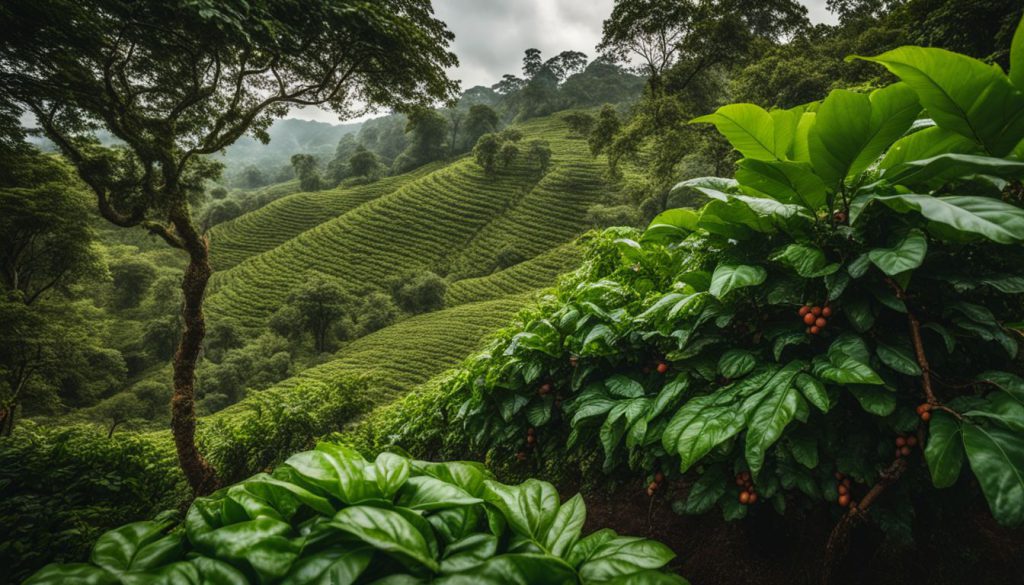Blog
Exploring The Rich Flavour Of Chinese Coffee Beans: A Specialty Roaster’s Guide
Are you tired of the same old coffee flavors? Want to taste something truly special? Let’s take a journey to China, where coffee beans are bursting with unique flavors. In this guide, we’ll explore the rich world of Chinese coffee and how specialty roasters bring out its best qualities.
The Rich Flavour Profile of Chinese Coffee Beans
Chinese coffee beans boast a diverse and delightful flavour profile that will tantalize your taste buds. From the smooth and nutty notes of Yunnan Arabica to the bold and robust character of Hainan Robusta, these beans offer a unique and satisfying coffee experience.

Yunnan Arabica Coffee
Nestled in the heart of China’s Yunnan province, Banka farm and washing station produce some of the finest Arabica coffee beans in the world. These beans are cultivated at high altitudes, which imparts a distinct flavor profile that sets them apart from other coffee varieties.
The mountainous landscape and mild climate of Yunnan create the perfect conditions for growing exceptional coffee, with notes of sweet caramel, rich chocolate, and a hint of citrus acidity.
At Banka farm, the coffee cherries are handpicked and carefully sorted to ensure only the ripest and highest quality beans make it into your cup. The beans are then processed using a variety of methods, including natural and washed processing, to bring out the unique characteristics of each batch.
Yunnan Coffee Traders, who manage the farm and washing station, are constantly experimenting with new processing techniques and growing rare varieties like Pacamara and Yellow Bourbon to push the boundaries of what’s possible with Yunnan Arabica coffee.
When you brew a cup of Yunnan Arabica coffee, you’re not just enjoying a delicious beverage – you’re experiencing the result of generations of expertise and dedication to the craft of coffee production.
Hainan Robusta Coffee
Hainan, a tropical island in southern China, is home to a thriving robusta coffee industry. The warm, humid climate and rich volcanic soil create ideal conditions for growing this hardy coffee varietal.
Robusta coffee from Hainan is known for its bold, full-bodied flavor with hints of nuttiness and a smooth finish.
Specialty roasters have taken an interest in Hainan robusta, experimenting with various roasting techniques to bring out its unique characteristics. Light to medium roasts highlight the coffee’s natural sweetness and nutty undertones, while darker roasts create a robust, smoky flavor that pairs well with milk-based drinks like lattes and cappuccinos.
Role of Specialty Roasters
Specialty roasters play a vital role in unlocking the full potential of Chinese coffee beans. They carefully select the finest beans from the best growing regions like Yunnan and Hainan.
These artisans then roast the beans to perfection, using their expertise and state-of-the-art equipment to bring out the unique flavors and aromas. From light to dark roasts, they craft a range of flavor profiles to suit every palate.
But it’s not just about the roasting process. Specialty roasters also work closely with farmers and importers to ensure the beans are harvested and processed using the best methods.
Whether it’s natural, washed, or honey processed, they strive to showcase the distinct characteristics of each bean. By sourcing directly from farms and cooperatives, they support sustainable practices and fair prices for growers.
So next time you sip a cup of Chinese specialty coffee, take a moment to appreciate the dedication and craftsmanship that went into every bean.
China’s Influence on Global Coffee Industry
China’s impact on the global coffee market grows each year. The country is now a major player in coffee production and consumption. In 2020, China produced over 2 million bags of coffee, making it the 13th largest producer worldwide.
Yunnan province alone accounts for 95% of China’s total output. The region’s unique climate and soil create distinct flavor profiles sought after by specialty roasters around the globe.
As Chinese consumers embrace coffee culture, demand for high-quality beans surges. Starbucks plans to open 6,000 stores across China by 2022, while homegrown brands like Luckin Coffee expand rapidly.
This increased consumption drives imports from traditional coffee-growing nations like Brazil and Colombia. China’s rising middle class and shifting tastes also present opportunities for niche markets such as single-origin coffees and cold brews.
China’s influence extends beyond its borders through investments in coffee-producing countries. Chinese companies have acquired plantations and processing facilities in places like Ethiopia and Indonesia.
These strategic moves secure supply chains and give China greater control over the global coffee trade. As the nation’s economic clout grows, so too does its ability to shape the future of the industry.
From farm to cup, China’s mark on the world of coffee is undeniable.
Conclusion: The Future of Chinese Coffee Beans
As the demand for specialty coffee surges, Chinese coffee beans are set to make a splash on the global stage. With their distinct flavor profiles and the dedication of skilled roasters, these beans offer a unique and exciting experience for coffee lovers everywhere.
As more people discover the hidden gems of China’s coffee industry, it’s clear that the future is bright for these remarkable beans.
FAQs
Where is coffee grown in China?
China grows arabica coffee, mainly in the Menglian region of Yunnan province. This area borders Vietnam, Myanmar and Laos.
When did coffee cultivation start in China?
Coffee was first brought to Yunnan province in the late 19th century. But it really kicked off in 1988 when the Chinese government pushed for more coffee farming.
What coffee varieties are grown in China?
Catimor is a popular coffee cherry variety in China. Typica, a classic South American variety, is also grown.
How is Chinese coffee processed?
Chinese coffee uses various processing methods. The natural process is common, where the entire coffee cherry is dried before the bean is removed. Washed and honey processed coffees are also produced.
Is Chinese coffee specialty grade?
Yes, an increasing number of Chinese coffee is specialty grade. Places like Fuyan Farm in Menglian are focusing on quality over quantity.
How much coffee does China produce?
China is one of the world’s largest coffee producers. Much of the coffee is for domestic consumption, but exports are on the rise. In Pu’er City alone, over 1000 hectares are dedicated to coffee production.



